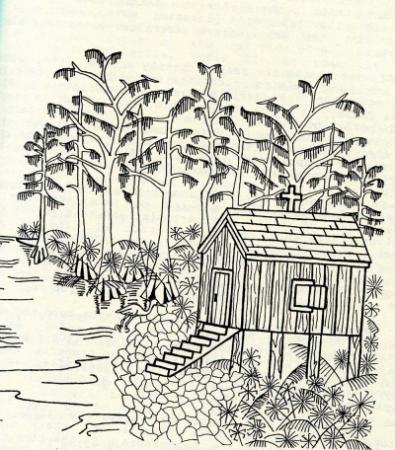Chuka-Chaba/Night Cabin
East Bank of Bayou Castine, near the shoreline of Lake Pontchartrain: The site of Chuka-Chaba or the Night Cabin. Father Adrien Rouquette was born in New Orleans in 1813 to a wealthy Creole family. When his father died in 1819, his mother returned to her family and place of her birth, Bayou Lacombe. Her father, Francois Cousin, was by this time, the largest single land owner in St Tammany with lands that reached from Bayou Bonfouca to Ravinne aux Cannes (Cane Bayou). Young Adrien became a child of the woods, playing with the young Choctaw in the area.
After an education abroad, Rouquette returned to New Orleans and was ordained in 1845. By the late 1850s, he had chosen the missionary life among his beloved Choctaw in the country of his childhood.
Known as 'Chata-Ima' (like a Choctaw) Pere Rouquette spoke the language and adopted the wardrobe of his Choctaw friends. He wrote poetry, fought fiercely to protect his fragile flock and built 5 chapel-cabins, 4 of which were on family land.
Chuka-Chaba, constructed on the land belonging to his brother Terrance and his wife, Antoinette Faure, was a mile to the east of Mandeville, across Bayou Castine on a rickety wooden bridge, almost to shoreline of Lake Pontchartrain.
Built on stilts, the single room Night Cabin was a way point for the Choctaw between their village near Lacombe and the steamer landing in Mandeville. It was described as a 'happy place' for Rouquette, spending time there with his young nieces and nephew who lived nearby.
Between 1876-80, the family sold the land to George Nott with a proviso that the 'space now used as a cemetery about 30' square to remain undisturbed and the Rouquettes to have the right to access to the same at all times until it shall please them to remove the remains.'
The last mention of Chuka-Chaba is in a letter from Pere Rouquette to a friend in 1884. In it he said that the small cabin was still standing with the wooden cross above it.
Rouquette died in New Orleans in 1886. His Choctaw family kept vigil outside of Hotel Dieu, then followed his casket to its final resting place in New Orleans.


